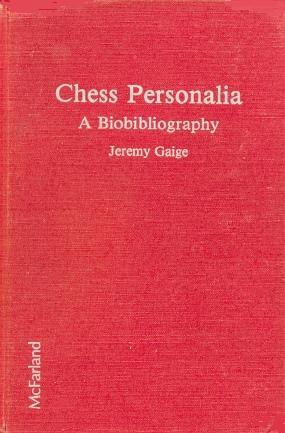
Edward Winter
Most chess books published by McFarland & Company, Inc. (Jefferson, NC, USA) between 1984 and 2019 have been, at least, mentioned in C.N. (see, for example, the Factfinder). Below is a selection of volumes which stand out either for their quality or for their lack of it. In conclusion, a number of C.N. items are reproduced in which we looked more broadly at McFarland’s chess output.
***
The Literature of Chess by J. Graham (1984)
See The Chess Chamber of Horrors.
The Book of Chess Lists by A. Soltis (1984; second edition 2002 – Chess Lists)
See Andrew Soltis.
Chess Personalia A Biobibliography by J. Gaige (1987 + paperback edition)

See Jeremy Gaige and Timothy D. Harding (Chess Writer and Historian).
Women in Chess by J. Graham (1987)
See Chess and Women and Reliability Eroded (Kenneth Whyld).
Chess World Championships by James H. Gelo (1989 + updated paperback edition)
See Book Notes.
A. Alekhine Agony of a Chess Genius by P. Morán (1989 + paperback edition)
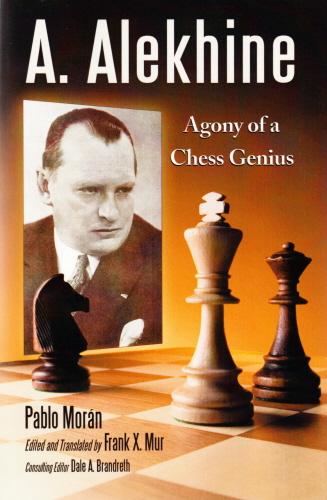
See Alexander Alekhine Miscellanea.
Capablanca A Compendium of Games, Notes, Articles, Correspondence, Illustrations and Other Rare Archival Materials on the Cuban Chess Genius José Raúl Capablanca, 1888-1942 by E. Winter (1989 + paperback edition)
See The Writing of a Book on Capablanca.
William Steinitz Chess Champion by K. Landsberger (1993 + paperback edition)
See Wilhelm Steinitz Miscellanea.
Frank Marshall, United States Chess Champion by A. Soltis (1994 + paperback edition)
See Frank James Marshall.
Samuel Reshevsky A Compendium of 1768 Chess Games with Diagrams, Crosstables, Some Annotations, and Indexes by S.W. Gordon (1997 + paperback edition)
See The Chess Prodigy Samuel Reshevsky.
Alexander Alekhine’s Chess Games, 1902-1946 by L.M. Skinner and R.G.P. Verhoeven (1998 + paperback edition)
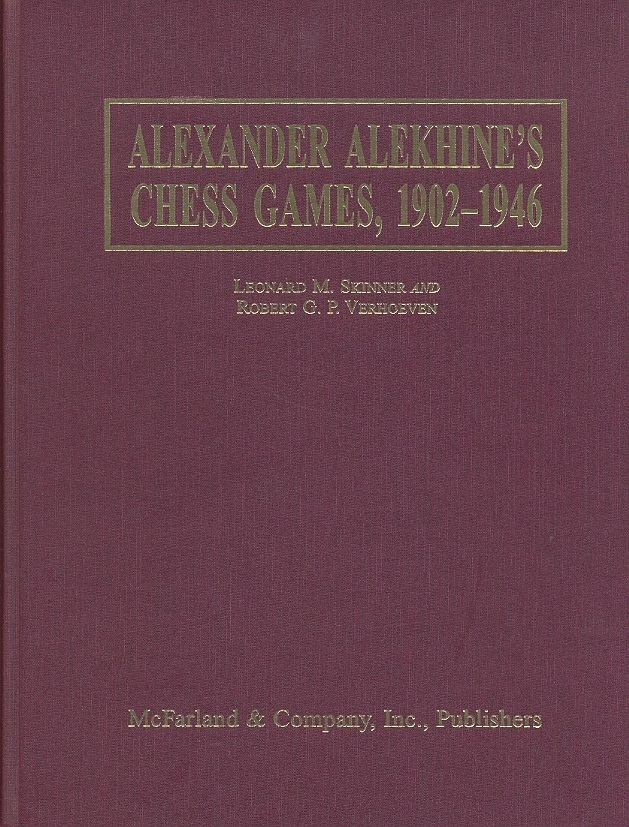
The Steinitz Papers by K. Landsberger (2002 + paperback edition)
See Wilhelm Steinitz Miscellanea.
Amos Burn A Chess Biography by R. Forster (2004 + paperback edition)
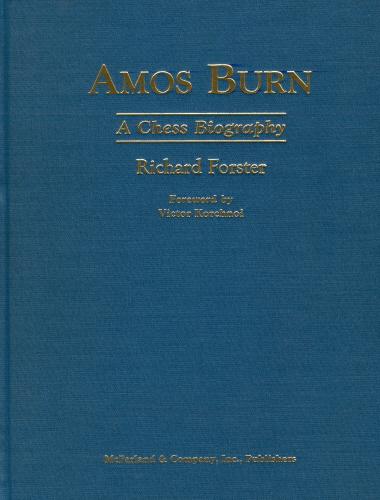
See Macdonald v Burn, Liverpool, 1910.
Chess Results by G. Di Felice (2004 + multiple further volumes)
See Chess Jottings.
The Tragic Life and Short Chess Career of James A. Leonard, 1841–1862 by J. Hilbert (2005 + paperback edition)
See James A. Leonard.
Great Chess Books of the Twentieth Century in English by A. Dunne (2005)
Blindfold Chess by E. Hearst and J. Knott (2009 + paperback edition)
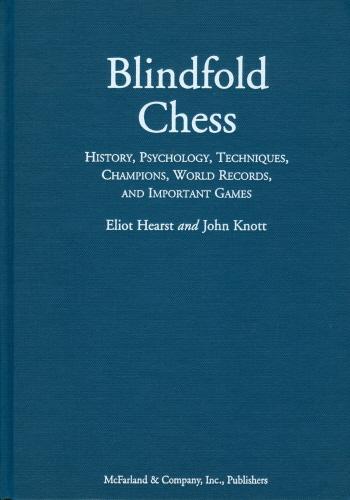
See Blindfold Chess.
Isaac Kashdan, American Chess Grandmaster by P.P. Lahde (2009 + paperback edition)
Aron Nimzowitsch On the Road to Chess Mastery, 1886-1924 by P. Skjoldager and J.E. Nielsen (2012 + paperback edition)
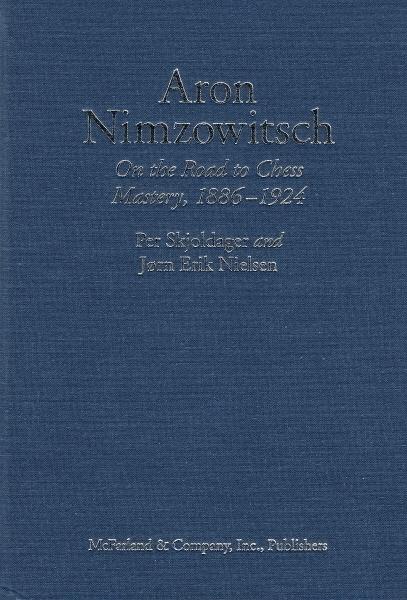
See Aron Nimzowitsch.
Joseph Henry Blackburne A Chess Biography by T. Harding (2015)
See Joseph Henry Blackburne and Timothy D. Harding (Chess Writer and Historian).
José Raúl Capablanca A Chess Biography by M.A. Sánchez (2015 + paperback edition)
See José Raúl Capablanca Miscellanea.
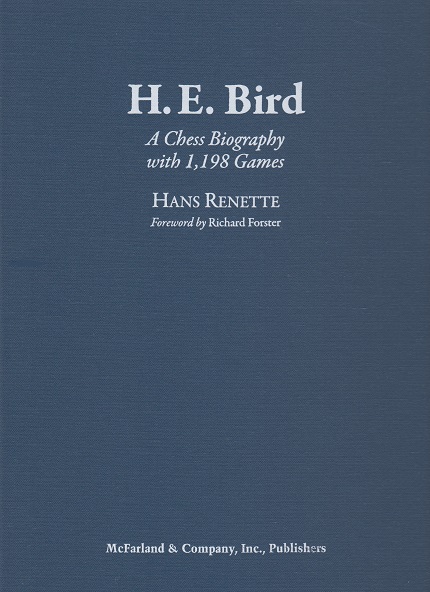
See C.N. 10177.
Vera Menchik A Biography of The First Women’s World Champion, with 350 Games by R.B. Tanner (2016)
W.H.K. Pollock A Chess Biography with 523 Games by O.G. Urcan and J.S. Hilbert (2017)
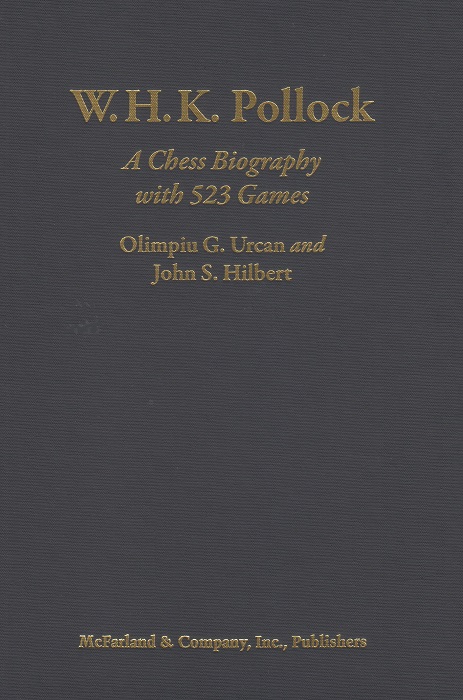
See A Chess Idealist.
British Chess Literature to 1914 by T. Harding (2018)
See Timothy D. Harding (Chess Writer and Historian) and Jeremy Gaige.
Kurt Richter A Chess Biography with 499 Games by A. McGowan (2018)
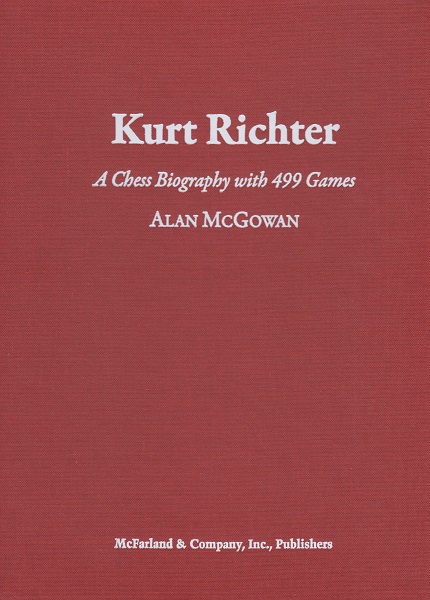
See C.N. 11108.
Fred Reinfeld The Man Who Taught America Chess, with 282 Games by A. Dunne (2019)
***
McFarland & Company, Inc. is often said to produce the finest chess books, and the company’s catalogue certainly has many very good volumes, including a few of superb quality. Such is the company’s reputation that some reviewers tend to give an unthinkingly warm welcome to any new McFarland title, but blanket praise does a disservice to a truly exceptional book such as Aron Nimzowitsch On the Road to Chess Mastery, 1886-1924 by Per Skjoldager and Jørn Erik Nielsen and is far too generous to, for instance, Isaac Kashdan, American Chess Grandmaster by Peter P. Lahde.
In this sense, McFarland books may serve as a test of the book reviewer’s knowledge, judgement and reliability. If he writes that William Steinitz, Chess Champion by Kurt Landsberger is a dependable work of scholarship, alarm bells should ring.
As mentioned in C.N. 6266, the 1994 ‘Book of the Year’ prize from the British Chess Federation went to another handsome McFarland hardback, Frank Marshall, United States Chess Champion by Andrew Soltis, the judges being two non-historians, Raymond Edwards and John Littlewood. C.N. items have reported in detail on many of the book’s deficiencies; see, for instance, the remarks of two correspondents in C.N.s 4738 and 6266. To mention another example, in C.N. 2798 (an item also given on page 227 of Chess Facts and Fables) we quoted from an entry in the bibliography on page 371 of the Marshall book:
‘LeLionnais, Francois. Les Preix de Beatue aux Echecs. Payot. Paris 1970.’
Our comment was that ‘a proof-reader, had there been one, would have made four or five corrections to that single line’. The hypothetical correcteur would also have had his work cut out with the index, which has such entries as Clintrón, Lischütz, Jacque Mieses, Nimzovic, O’Briend, Rey Arduid, Carlose Torre, and Voight.
There has probably never been a chess book wholly free of error, but it is a question of degree and of whether the author, whatever his lapses, shows signs of caring. When McFarland brought out a paperback edition of the Marshall volume in 2013, no such signs were in evidence. All the faulty index entries mentioned above were left uncorrected, as were virtually all the historical mistakes pointed out in C.N. over the years.
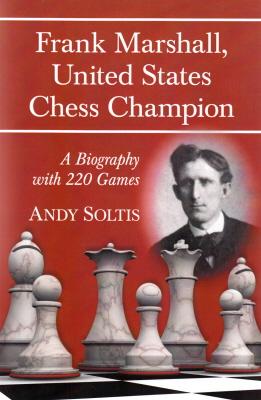
(8494)
On pages 52-53 of the 1/2014 New in Chess Nigel Short writes about rapid chess (defined in the article as games with ‘approximately half an hour per player’). The final paragraph:
‘In recent years, publishers have commissioned biographies of ever-more obscure, peripheral chess figures. I have read the weighty McFarland hardback of Albert Beauregard Hodges from beginning to end and I still can’t tell you anything about him. Quite possibly this is because I am a philistine, or an amnesiac, but the alternative explanation is that Hodges’ life is not an inherently interesting subject. Far better would be for some proper researcher to examine the enormous wealth of material on rapid chess and write its definitive history. With luck, this briefest of sketches may serve as a catalyst.’
A book on such a topic (ideally, on all forms of fast chess) could certainly be an excellent addition to the thematic chess books of McFarland & Company, Inc., which include Blindfold Chess by E. Hearst and J. Knott (2009) and, alas, Women in Chess by J. Graham (1987), although not much else. Chess prodigies is another subject which would lend itself to the McFarland treatment.
As regards biographical works, a number of world champions and other leading players have been covered by McFarland authors, and some books, such as Reuben Fine by A. Woodger (2004), have been strangely neglected. Comprehensive, academic volumes on figures like Euwe and Fischer would be highly desirable additions, as would English translations of the large volumes on, for instance, Tarrasch and Janowsky currently available only in German, as mentioned in C.N. 6803.
McFarland’s biographical tomes also feature many relatively unfamiliar masters (of whom Hodges is not the least familiar), and they are particularly welcome when, as is customarily the practice, they deal too with the overall chess context of the subject’s period and locality. For example, our Foreword to The Tragic Life and Short Chess Career of James A. Leonard, 1841-1862 by John S. Hilbert (2006) observed:
‘Yet while Leonard remains the focus of attention in these pages, the broader tableau of US chess in the early 1860s is also ably presented. So too is the agony of the Civil War, which cost Leonard his life.’
Writing such books demands much skill, to blend the proper level of documentary detail about the master (not an indiscriminate deluge) with a satisfying overview of the context (not simplistic waffle about geopolitics).
In certain areas McFarland needs to show considerably more rigour (in its choice of chess authors and in how it processes some books), but its catalogue continues to grow impressively. We hope to see many new books in all three categories mentioned above, i.e. on the world’s leading players, on unsung figures and on thematic topics.
(8530)
An extract from C.N. 9500:
The dust-jacket of Players and Pawns (Chicago and London, 2015) states that ‘Gary Alan Fine is the John Evans Professor of Sociology at Northwestern University’ and introduces his book thus:
‘A chess match seems as solitary an endeavor as there is in sports: two minds, on their own, in fierce opposition. In contrast, Gary Alan Fine argues that chess is a social duet: two players in silent dialogue who always take each other into account in their play. Surrounding that one-on-one contest is a community life that can be nearly as dramatic and intense as the across-the-board confrontation.’
Beyond such woolliness, the book is striking for a heavy USA-centric approach, the author’s unfamiliarity with chess history and lore, and a staggering lack of discernment in the sources cited.
As demonstrated by the concluding ‘Notes’ section (pages 227-261), the Professor has no interest in, or access to, primary sources and makes do with material unquestioningly derived from familiar books and webpages which are themselves derivative. Those ‘sources’ in the Notes section include an Internet quotations site (itself devoid of sources) and such embarrassments as ‘Internet Chess Club discussion boards, 2010’.
Professor Gary Alan Fine is unrelated to Reuben Fine, he states on page 1. He makes frequent, naively trusting, mention of his namesake, although his interest has its limits. Page 205 discusses the wonder of databases, which ‘have replaced wood pulp’: ‘Fully 389 of Reuben Fine’s games are archived ...’ There is no awareness of Aidan Woodger’s carefully researched monograph on Reuben Fine, published by McFarland & Company, Inc. in 2004, which has well over twice as many games by Fine as the ‘fully 389’.
McFarland books are of no concern to Professor Fine, who instead goes as far down-market as possible for his raw material and pseudo-sources. No would-be facts have been scrutinized with care.
To state the obvious, or what ought to be, great wariness is required over ‘community’ websites which, instead of trying to get matters correct from the outset, allow individuals, usually unnamed, to post whatever they choose. The onus is placed on others to try to make rectifications if they can be bothered.
In the particular case of Wikipedia, the quality of chess entries varies enormously (C.N. 5919 named two good ones, and there has been considerable overall improvement to the site since then). Discernment remains essential, and quoting Wikipedia is not a step to be taken lightly.
In C.N. 8110 (see Chess: The Need for Sources) a correspondent pointed out that in The Immortal Game by David Shenk (New York, 2006) ‘details of Spassky’s chess career are attributed to a Wikipedia entry’. Recent books with no qualms about citing Wikipedia include Miguel A. Sánchez’s volume on Capablanca (C.N. 9456); see pages 509 and 527. From the latter page:
‘According to Wikipedia ... But according to the more reliable version of Andy Soltis in ...’
McFarland books really should do better than that.
(9511)
Why can readers of McFarland books expect, or at least hope, to see exact sources for quotations, whereas so many other publishers show no sign of having even considered such a requirement? Why, if McFarland’s overall output is praised for its ‘scholarship’, do reviewers refrain from criticizing other publishers for a lack thereof? In any case, the issue at hand is ‘scholarship’ of a most basic kind. When an author says that someone said something, saying where and when it was said is not a donnish luxury or self-indulgence but an essential service to the reader which should be automatic.
(9583)
Do readers know of any magazines or websites which, systematically and comprehensively, produce authoritative reviews of new chess books?
‘Authoritative’ excludes all those easily pleased outlets making do with superficial impressions which could be written by virtually anybody. For example, a reviewer who praises The Joys of Chess by C. Hesse (Alkmaar, 2011), not realizing that it is unreliable and makes excessive, insufficiently credited use of earlier writers’ work, is unqualified to review books in, at the very least, that category. A reviewer of a new openings monograph needs proper knowledge of what has already been published on the same opening. A reviewer who imagines that all McFarland books (even the Steinitz biography by K. Landsberger) merit indiscriminate eulogies has no business publicly assessing works about chess history. Plaudits are deserved by many McFarland titles, but not all, and it is the critic’s task to make the requisite distinctions. A reviewer whose own volumes are notorious for blunders and other defects (plagiarism, for instance) should be neither reviewing nor authoring. Nor, of course, should any writer wish to quote favourable opinions received from such a reviewer. T. Harding rushing to cite R. Keene’s fulsome praise of his Blackburne book was a pathetic spectacle.
Some people are qualified to evaluate no chess books of any kind, but nobody is qualified to evaluate the full range of the game’s literature. C.N. 3766 referred to the skill of Brian Reilly, as editor of the BCM, in bringing together a team of excellent book reviewers which included J.M. Aitken, W.H. Cozens, G.H. Diggle, W. Heidenfeld and D.J. Morgan, each with his specialities.
(9592)
In Reviewing Chess Books C.N. 9592 prompted a question: is there any chess writer less McFarlandish than Raymond Keene?
From our feature article Breyer and the Last Throes:
The superficial treatment of the ‘last throes’ topic in Gyula Breyer. The Chess Revolutionary by Jimmy Adams (Alkmaar, 2017) was discussed in C.N. 10563. See too C.N. 10661, which observed that much of Mr Adams’ response, at the Kingpin website, to our criticism of his book reads like a leg-pull. On the central issue we commented in C.N. 10661:
In recent decades, historical chess biographies have seen a major advance in scholarship, with far greater recognition of the need for precise sources. The world’s leading publisher in the field is McFarland & Company, Inc., and any list of its best biographical works is likely to include the following:
- Stephen Davies: Lipschütz;
- Richard Forster: Burn;
- Stephen W. Gordon: Reshevsky;
- Tim Harding: Blackburne and Eminent Victorian Chess Players;
- John S. Hilbert: Hodges (with Peter P. Lahde), Kemeny, Leonard, Pollock (with O.G. Urcan), Shipley;
- Martin Frère Hillyer: Frère;
- Hans Renette: Bird;
- Miguel A. Sánchez: Capablanca;
- Leonard M. Skinner and Robert G.P. Verhoeven: Alekhine;
- Per Skjoldager and Jørn Erik Nielsen: Nimzowitsch;
- Olimpiu G. Urcan: Albin, Finn, Kaufmann (with P.M. Braunwarth), Pollock (with J.S. Hilbert);
- Joost van Winsen: Mason;
- Aidan Woodger: Fine;
- Fabrizio Zavatarelli: Kolisch.
Question: How many of the above authors treat sources in a manner even remotely similar to Jimmy Adams’ method?
Answer: None.
To the Chess Notes main page.
To the Archives for other feature articles.
Copyright: Edward Winter. All rights reserved.